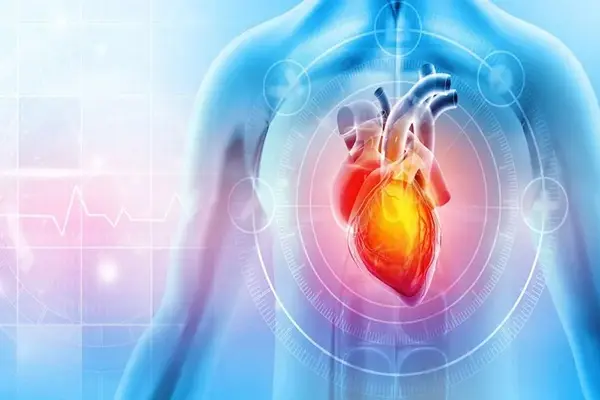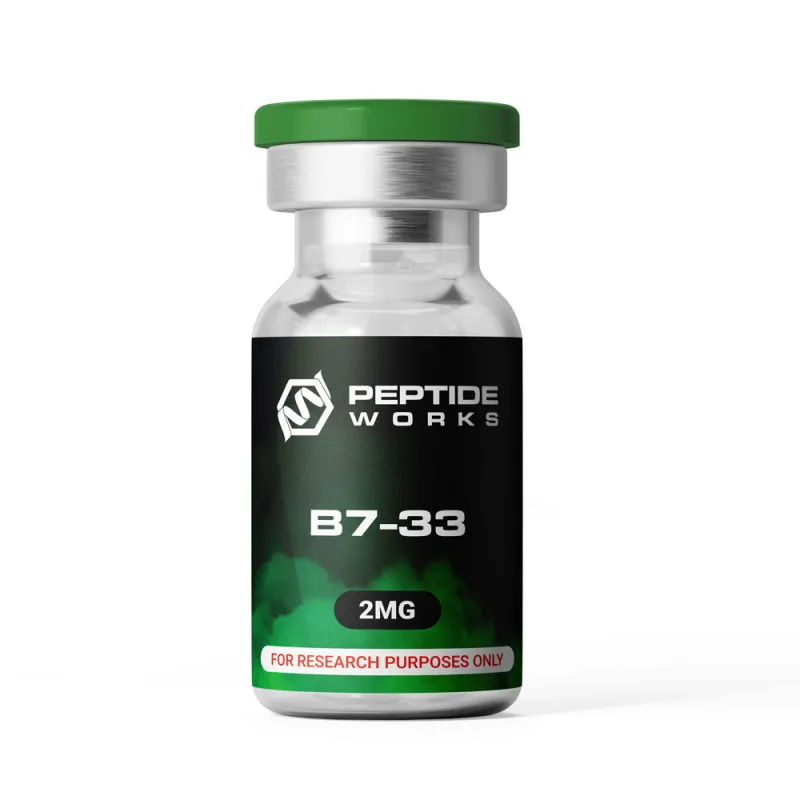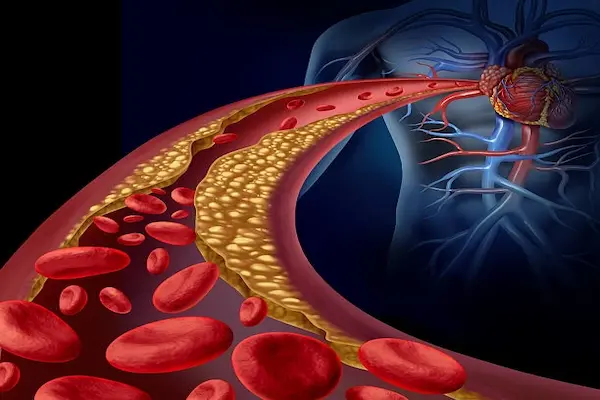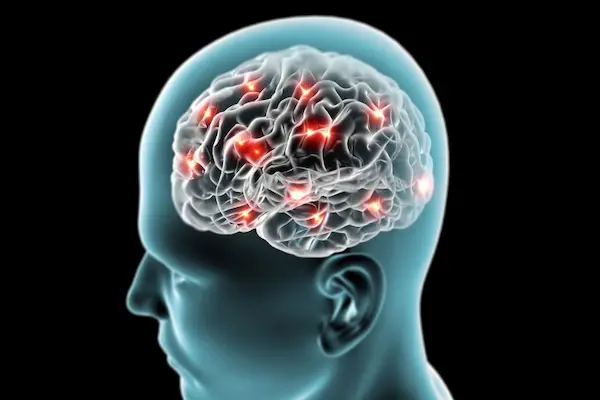
PROMO!
First order? Get 10% OFF with this code: 1storder
Written by

B7-33 peptide benefits help protect the heart in lab studies. This lab-made peptide fights heart disease in many ways. It works by targeting special parts of heart cells that keep the heart safe.
B7-33 works with relaxin paths to reduce heart scarring. It also helps blood flow better to hurt heart tissue. Lab tests show B7-33 may stop scar tissue from forming after heart attacks.
This makes it useful for learning about heart health. These peptides are for lab use only and not for human use.
Explore B7-33 Peptide from Peptide Works, a synthetic relaxin analog studied for reducing cardiac fibrosis and improving heart tissue repair.

Cardiac fibrosis represents a critical challenge in heart health that B7-33 peptide benefits address through sophisticated cellular mechanisms.
The peptide works by modulating fibroblasts, which are key cells responsible for fibrotic tissue formation after cardiac injury. B7-33 influences the activation of specific pathways that control collagen production and matrix remodeling.
This targeted approach helps prevent excessive scarring that typically follows myocardial infarction events. The peptide’s ability to regulate matrix metalloproteinase activity creates opportunities for improved tissue repair without harmful inflammation buildup.
Laboratory investigations demonstrate significant efficacy in preventing chronic damage progression.
Collagen control is key to how well the heart heals after damage. B7-33 peptide benefits help manage this protein that forms the heart’s structure. When the heart gets hurt during an infarction, collagen must rebuild in the right way.
Too much collagen makes stiff scars that hurt heart function. Too little collagen makes weak spots that can tear. B7-33 works through specific pathways to keep collagen balanced.
It helps primary cardiomyocytes work with collagen properly. This process controls the matrix that holds heart cells together. Good collagen control stops harmful inflammation while keeping the heart strong and flexible.

Heart inflammation is a major problem that B7-33 peptide benefits address through immune responses control. The peptide targets receptors that stop chronic inflammation from hurting blood vessels and heart muscle.
B7-33 helps reduce endoplasmic reticulum stress in heart cells, which causes harmful swelling. It works by changing kinase activation that controls inflammatory signals. The peptide also helps prevent high blood pressure by keeping blood vessels healthy.
For chronic neuropathic pain, AICAR peptide works by targeting NAD pathways that control nerve inflammation. This creates potential benefits for managing pain conditions that affect multiple organ systems.
Discover AICAR Peptide from Peptide Works, a research compound that targets cellular energy and NAD pathways to support nerve and heart health.
The endoplasmic reticulum is a part inside heart cells that makes proteins and keeps them folded right. When heart cells get hurt, this system gets damaged and creates stress.
B7-33 peptide benefits help fix this problem by stopping the unfolded protein response that hurts cells. This stress makes heart rate go up and can lead to acute heart failure if not fixed.
The peptide hormone works by helping cells handle stress better and keep making good proteins. When the endoplasmic reticulum works right, heart cells stay healthy even during hard times.
This process is key for keeping cardiomyocytes alive after heart attacks and other cardiac events.
Cardiomyocytes are the main muscle cells that make the heart beat and pump blood. B7-33 peptide benefits protect these vital cells by stopping damage at the cellular level.
Laboratory studies show the peptide has pleiotropic effects, meaning it helps cells in many different ways at once. B7-33 keeps cardiomyocytes alive during heart attacks by helping them use energy better and stay strong.
Research using polymerase chain reaction analysis demonstrates how well these heart muscle cells survive with B7-33 treatment. The peptide also works with human relaxin to keep cell membranes healthy and flexible.
Further research shows these heart muscle cells can recover faster and work better when protected by B7-33.

Pleiotropic effects means one treatment helps in many different ways at the same time. B7-33 peptide benefits show significant reduction in multiple heart problems through various cellular pathways.
Studies demonstrate the peptide works on different receptors to boost heart function and prevent fibrotic tissue formation. B7-33 helps improve tissue repair while supporting healthy immune responses throughout the body.
The compound shows efficacy in stopping acute heart failure by working through NAD-dependent cellular processes. Product information indicates this multi-target approach makes B7-33 especially valuable for comprehensive heart protection. This explains why the peptide shows such promising results in cardiovascular studies.
Heart disease often involves harmful immune activity that damages cardiovascular tissue. B7-33 peptide benefits help balance immune responses to protect against myocardial infarction through controlled activation of protective pathways.
Laboratory findings show the peptide works by managing immune cells that otherwise trigger vessel damage. B7-33 helps prevent immune-related cardiac events by supporting proper cardiac function during stress.
The compound also works with the body’s natural systems to help immune cells function properly with heart tissue instead of attacking it. This immune-balancing effect makes B7-33 particularly valuable for autoimmune heart conditions.
Looking ahead, peptides like B7-33 and AICAR represent the next wave of targeted therapies for chronic neuropathic pain management. These compounds show potential benefits extending beyond cardiovascular applications to include nerve pain through similar cellular mechanisms.
Peptide Works continues to provide high-quality compounds to support advancing studies in this field. As investigations explore these peptides for laboratory applications, the future looks promising for developing more effective, targeted approaches to chronic pain management through peptide-based interventions.
All peptides and compounds mentioned are strictly for research purposes only and not for human use.
References:
[1] Devarakonda T, Mauro AG, Guzman G, Hovsepian S, Cain C, Das A, Praveen P, Hossain MA, Salloum FN. B7-33, a Functionally Selective Relaxin Receptor 1 Agonist, Attenuates Myocardial Infarction-Related Adverse Cardiac Remodeling in Mice. J Am Heart Assoc. 2020 Apr 21;9(8):e015748.
[2] Maruyama K, Imanaka-Yoshida K. The Pathogenesis of Cardiac Fibrosis: A Review of Recent Progress. Int J Mol Sci. 2022 Feb 27;23(5):2617.
[3] Chow BS, Chew EG, Zhao C, Bathgate RA, Hewitson TD, Samuel CS. Relaxin signals through a RXFP1-pERK-nNOS-NO-cGMP-dependent pathway to up-regulate matrix metalloproteinases: the additional involvement of iNOS. PLoS One. 2012;7(8):e42714.
[4] Valle Raleigh J, Mauro AG, Devarakonda T, Marchetti C, He J, Kim E, Filippone S, Das A, Toldo S, Abbate A, Salloum FN. Reperfusion therapy with recombinant human relaxin-2 (Serelaxin) attenuates myocardial infarct size and NLRP3 inflammasome following ischemia/reperfusion injury via eNOS-dependent mechanism. Cardiovasc Res. 2017 May 1;113(6):609-619.
ALL CONTENT AND PRODUCT INFORMATION AVAILABLE ON THIS WEBSITE IS FOR EDUCATIONAL PURPOSES ONLY.
DISCLAIMER: These products are intended solely as a research chemical only. This classification allows for their use only for research development and laboratory studies. The information available on our Peptide Works website: https://peptide-works.com/ is provided for educational purposes only. These products are not for human or animal use or consumption in any manner. Handling of these products should be limited to suitably qualified professionals. They are not to be classified as a drug, food, cosmetic, or medicinal product and must not be mislabelled or used as such.
Peptide Works
Related Articles

What are the Best Cognitive Peptides?
Cognitive peptides are short chains of amino acids that researchers are exploring for their potential effects on brain function. They

Achieving increased skin pigmentation without prolonged sun exposure has been demonstrated with Melanotan peptides in research. Two commonly studied options,

Can PTD-DBM Hair Growth Peptide Stop Balding?
Hair thinning and balding affect millions worldwide, often leading to frustration and limited options. This challenge has driven researchers to